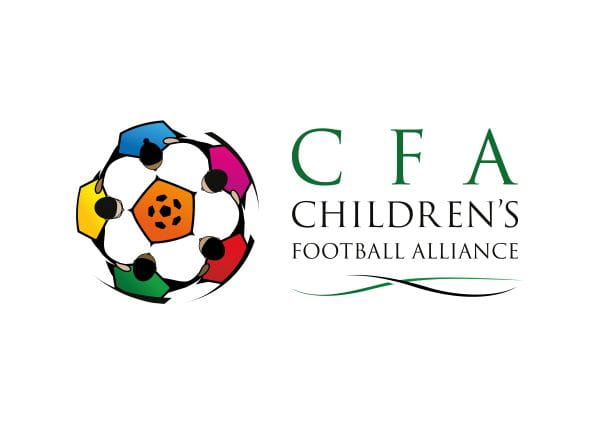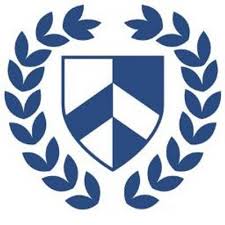UPDATE 13 11 19
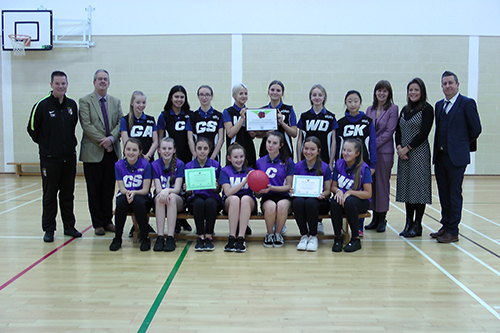
proudly display their Peace Fields Project Plaque which twins their peace pitch with Flanders Peace Field, Belgium, site of the 1914 First World War Christmas Truces. The spirit of the Christmas Truces was played through a competitive netball game. Ashfield Girls’ High School are first school in Belfast to twin their designated area of play. The School’s Ambassadors for Peace represented their communities, Belfast and Northern Ireland at the 2018 Global Peace Games.
‘The Ashfield Girls were a credit to their school at the Global Peace Games. They contributed to the games above and beyond expectations.’ Tim Wareing, NCFA Northern Ireland Project Manager,
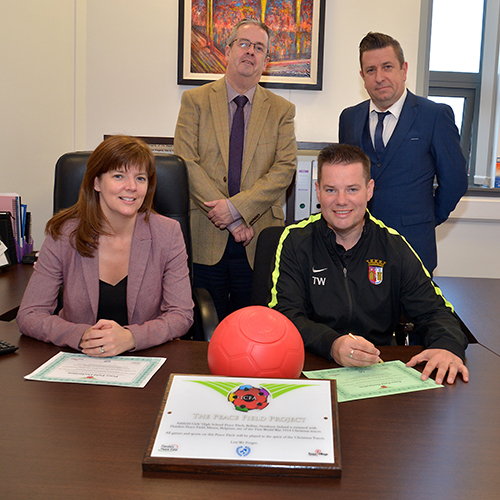
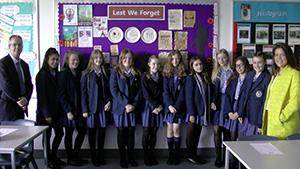
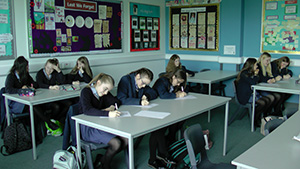
2018 Global Peace Games Reunion. Belfast’s young Peace Ambassadors got together to plan raising funds for their Peace Pitch. Students of Ashfield Girls School, Ashfield Boys School, Metropolitan College, Wellington College, Breda Academt, Down High School, St Malachays High, St Mary’s, Wallace High School and St Patrick’s Academy, are seeking to be the first schools in Belfast to twin a designated area of play with Flanders Peace Field, Mesen, Belgium, site of The First World 1914 Christmas Truces.
UPDATED 22/05/19
Rugby 7s Tournament celebrates Peace Fields twinning with Flanders and ERGS’s involvement in Global Peace Games 2019
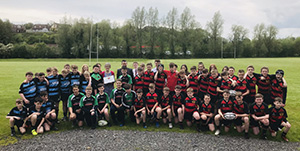
We were delighted to welcome Mr Ernie Brennan from the Childrens’ Football Alliance and ambassador of the Global Peace Games to school today, to present us with a Peace Fields plaque that officially twins the Eisenhower playing fields with the Flanders fields in Belgium. To celebrate the occasion, as the first school in Ireland to go through the twinning process, we held an U12 Rugby 7s tournament on the playing fields, welcoming teams from Omagh Academy, Devenish College and Erne Integrated College. A group of Year 10 ambassadors, who help with the running of today’s events, are now very much looking forward to travelling to Messiness Peace Village, Belgium later this year, where they will represent Northern Ireland in this year’s Global Piece Games residential and workshops. Well done to all those involved in a very successful afternoon of sport and celebration.
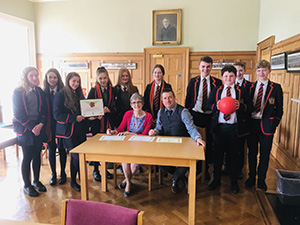
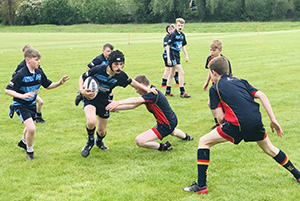
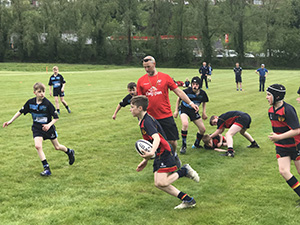
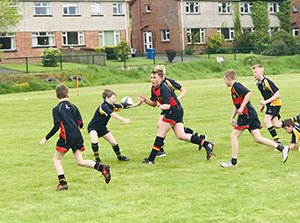
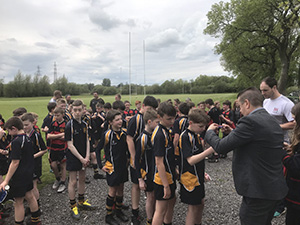
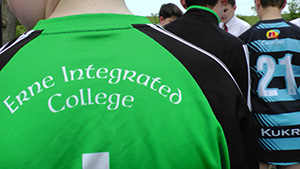
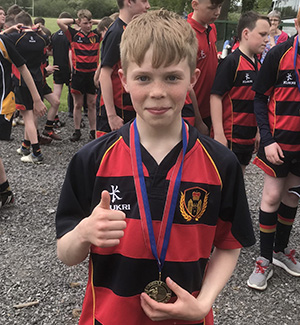
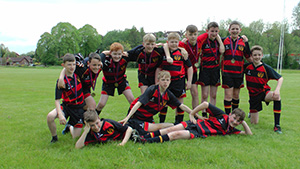
Peace Fields Rugby 7s Tournament
Click on LINK for Rugby 7s Programme
UPDATED JUNE 2018
CREGAGH EVENT PROGRAMME
click on the above link to download event programme
Media release on behalf of Belfast City Council 17 April 2018
Cregagh Green to be twinned with Flanders Peace Field Young people from east Belfast are at the heart of a unique Peace Field Project (PFP) to commemorate the centenary of the First World War. Organised by the National Children’s Football Alliance (NCFA), Cregagh Green is to be officially twinned with Flanders Peace Field in Belgium, site of the 1914 Christmas truces, where Allied troops and German forces came together to play football during a pause in the horror of war. Designated a Field in Trust, Cregagh Green was also where the legendary George Best first kicked a ball, and during his football career united communities across the city. And as part of the official twinning ceremony on Wednesday 18 April, pupils from three local primary schools will take part in a ‘friendly’ in memory of WW1. Alderman Tommy Sandford, chair of Belfast City Council’s City Growth and Regeneration Committee, who is attending tomorrow’s ceremony, said: “This is a very poignant way for the next generation to mark the centenary of the end of WW1; to reflect and learn about some of its history. “It’s long been acknowledged that sport can be a uniting factor and it’s the same today as it was 100 years ago – and how fitting that this is happening at the very place where Bestie played football as a young boy.” The young people taking part in the twinning event will also be attending the Global Peace Games in Messines, Belgium, in September. NCFA chairman Brendan Hanlon said: “More than 100 children will be involved in the twinning event which will evoke the spirit of the iconic Christmas truces football games in 1914. “This is a wonderful way of bringing the community together and I hope that some of the young people taking part might make new friends and this could become a regular fixture on the local sporting calendar.” Ernie Brennan, NCFA CEO, added: “There are many monuments commemorating war; the peace pitch not only commemorates war, but celebrates peace. Sport is a brilliant way to bring people from all different backgrounds together. “There is no finer symbolic place than the home of George Best – one of the world’s greatest footballers – to designate as a peace pitch.” A presentation by the NCFA is taking place this evening (Tuesday) at Cregagh Community Centre. NOTES to EDITORS National Children’s Football Association (NCFA) is a coalition of agencies and organisations that safeguard and advance the rights of children in football. The NCFA also acts as a focal point and network for individuals and organisations seeking sustainable partnerships, information, education and/or training on child-centred approaches and children’s rights in football. The Peace Fields Project (PFP) is an extension of the Heritage Lottery funded 2014 Football and Peace Project, inspired by the Christmas truces of 1914. It considered how a symbolic moment of WW1 history relates to the present day mission of the NCFA. PFP linked the escapism of play with the historic and explored conflict resolution. It provided young people with the opportunity to research their heritage in the First World War through the medium of sport. All participants pledged to twin their designated areas of play with Flanders Peace Field, Messines, Belgium. ISSUED BY MARKETING AND CORPORATE COMMUNICATIONS, BELFAST CITY COUNCIL For further information and media enquiries please contact: Media Relations Office, Belfast City Council Tel: 028 90270221  This incredible WWI story of Catholic and Protestant from same street is one of many true-life stories that inspired The NCFA to approach Cregagh Community Association and Belfast City Council to consider a Peace Pitch. Twinning a designated area of play with Flanders Peace Field, site of the 1914 First World War Christmas Truces. The incredible story of two men from the same Belfast street who fought in the First World War is to be told as part of a series of events commemorating the centenary of the Battle of the Somme. ‘Medal in the Drawer’, a production by Belfast playwright Dr Brenda Winter-Palmer, charts the real-life war journey of two volunteers – one Protestant and one Catholic – from west Belfast, who joined up to fight with the 36th Ulster Division For Brenda, this was a labour of love inspired by her personal connection to one of the brave men depicted in the play – her great uncle, Rifleman Willie Kerr. She explained: “As a child I was always fascinated by a plaque that hung in the hallway of our Andersonstown home. It was inscribed with the name of William Kerr. “When asked, my mother told me that it was a medal that her uncle had received for fighting in the First World War. “No one in her family had talked much about him. Indeed in the 1970s in west Belfast not very many people talked freely about family connections with the BritishArmy.” Medal in the Drawer shines a light on the fact that, in the midst of the Home Rule crisis, a time of great unrest between nationalists and unionists in Ireland, William Kerr, a west Belfast Catholic, chose to join Carson’s predominantly Unionist 36th Ulster Division, rather of one of the Irish regiments. The young man enlisted almost immediately after the outbreak of war in 1914, along with Tom Martin, a Protestant who lived two doors away at Forthriver Gardens off the Springfield Road. The pair joined the 14th (Young Citizen Volunteer) Battalion of the Royal Irish Rifles and were shipped off to the Western Front, from where neither would ever return. Tom perished in a trench collapse in the lead up to the Somme, while William was killed in 1917 at Langemarck during the Third Battle of Ypres. The play also features two entirely fictional characters, who are based upon the experiences of real people. When she took on the daunting task of writing Medal in the Drawer, Brenda conceded that she knew comparatively little about the First World War. However, she did know about her ‘Uncle Willie’, and was keen to know more. For more information please click on the link
This incredible WWI story of Catholic and Protestant from same street is one of many true-life stories that inspired The NCFA to approach Cregagh Community Association and Belfast City Council to consider a Peace Pitch. Twinning a designated area of play with Flanders Peace Field, site of the 1914 First World War Christmas Truces. The incredible story of two men from the same Belfast street who fought in the First World War is to be told as part of a series of events commemorating the centenary of the Battle of the Somme. ‘Medal in the Drawer’, a production by Belfast playwright Dr Brenda Winter-Palmer, charts the real-life war journey of two volunteers – one Protestant and one Catholic – from west Belfast, who joined up to fight with the 36th Ulster Division For Brenda, this was a labour of love inspired by her personal connection to one of the brave men depicted in the play – her great uncle, Rifleman Willie Kerr. She explained: “As a child I was always fascinated by a plaque that hung in the hallway of our Andersonstown home. It was inscribed with the name of William Kerr. “When asked, my mother told me that it was a medal that her uncle had received for fighting in the First World War. “No one in her family had talked much about him. Indeed in the 1970s in west Belfast not very many people talked freely about family connections with the BritishArmy.” Medal in the Drawer shines a light on the fact that, in the midst of the Home Rule crisis, a time of great unrest between nationalists and unionists in Ireland, William Kerr, a west Belfast Catholic, chose to join Carson’s predominantly Unionist 36th Ulster Division, rather of one of the Irish regiments. The young man enlisted almost immediately after the outbreak of war in 1914, along with Tom Martin, a Protestant who lived two doors away at Forthriver Gardens off the Springfield Road. The pair joined the 14th (Young Citizen Volunteer) Battalion of the Royal Irish Rifles and were shipped off to the Western Front, from where neither would ever return. Tom perished in a trench collapse in the lead up to the Somme, while William was killed in 1917 at Langemarck during the Third Battle of Ypres. The play also features two entirely fictional characters, who are based upon the experiences of real people. When she took on the daunting task of writing Medal in the Drawer, Brenda conceded that she knew comparatively little about the First World War. However, she did know about her ‘Uncle Willie’, and was keen to know more. For more information please click on the link
